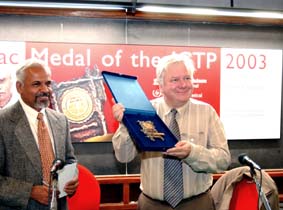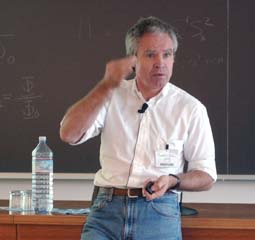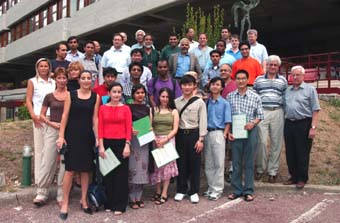Personal tools
News from ICTP 106 - Dateline

Director's Trip
K.R. Sreenivasan made his first international trip
as director of ICTP in July. The initial leg of his three-week
tour took him to the University of Newcastle in Australia, where
he helped to organise and gave the opening lecture for a meeting
on turbulence, his field of expertise. He then went on to visit
the Indian Institute of Science and the Jawaharlal Nehru Centre
for Advanced Scientific Research, in Bangalore, India, to give
the keynote address at an international conference on fluid dynamics.
His final destination was Rio de Janeiro, Brazil, where he presented
the keynote lecture on singular-like structures in hydrodynamic
turbulence at the Brazilian Mathematical Society's annual meeting.
In Brazil, he also met with officials of the Latin American Center
of Physics (CLAF), one of the most successful scientific networks
in Latin America whose collaboration with ICTP dates back to the
mid 1960s.
Calendar 2004
The Joint DEMOCRITOS-ICTP School on Quantum Monte Carlo Methods, scheduled to begin 12 January, will mark the Centre's opening research activity for 2004. More than 40 schools, colleges, workshops and conferences have been scheduled for next year. Topics range from optics to earthquakes; ecological economics to scientific e-learning; climate variability to nanotechnology; cosmology to medical physics; and complexity to neurophysics. Centre activities taking place outside Trieste include the Asian/Pacific Regional School on Electronic Structure Methods and Their Applications, scheduled to be held in China, and the Microprocessor Laboratory Second Central American Regional Course on Advanced VLSI Design Techniques, scheduled to take place in Mexico. In addition, plans are now underway for a series of scientific events marking the Centre's 40th anniversary. A preliminary listing of scientific activities has been posted on the Centre's homepage at www.ictp.it (under Scientific Calendar 2004).
Dirac Medal

ICTP director K.R. Sreenivasan and Vladimir E. Zakharov
The ICTP Dirac Medal 2003 was awarded to two international
experts in the field of turbulence. Robert H. Kraichnan,
Santa Fe, New Mexico, USA, and Vladimir E. Zakharov, Landau
Institute for Theoretical Physics, Moscow, Russian Federation,
and University of Arizona, Tucson, USA, were recognised "for
their contributions to the theory of turbulence and for identifying
classes of turbulence problems for which in-depth understanding
has been achieved." Each winner received a US$5,000 cash
prize. Zakharov delivered his Dirac Lecture on 10 September on
"Weak-Turbulent Theory of Ocean Waves." K.R. Sreenivasan
presented Kraichnan's Dirac Lecture, "Order and Randomness
in Fully-Developed Turbulence." Kraichnan could not attend
the ceremony because of ill health. The Dirac Medal is given in
honour of Nobel prize winner Paul A.M. Dirac, one of the Centre's
closest friends and most ardent supporters, who died in 1984.
For additional information about the Dirac Medal, see the Centre's web page at
www.ictp.it.
Nobel Bookends

Horst L. Stoermer
Two Nobel Laureates 'bookended' the Third Stig Lundqvist Conference
on Advancing Frontiers of Condensed Matter Physics: Fundamental
Interactions and Excitations in Confined Systems. Nobel Laureate
Alan Heeger (Chemistry 2000), a physicist and long-time
friend of ICTP's Condensed Matter Physics Group, was the first
speaker. Heeger, who won the Nobel Prize "for the discovery
and development of conductive polymers", teaches at the University
of California at Santa Barbara, Institute for Polymers and Organic
Solids and Department of Physics and Materials. Horst L. Störmer,
who won the 1998 Nobel prize in physics for his discovery of the
fractional quantum Hall effect, delivered the concluding lecture.
His talk, which took place on 15 August, examined "Recent
Results on Two-Dimensional Electrons." German-born Störmer,
professor of physics at Columbia University, and part-time adjunct
physics director at Bell Labs, Murray Hill, New Jersey, USA, is
a leading specialist in the field of nanotechnologies.
Preprints Archives
Scanned copies of all ICTP preprints issued from 1964 to 2000 are now available on the ICTP Library's home-page at library.ictp.trieste.it. The preprints can be retrieved in PDF format by searching under the author's name and/or title words. The database, which contains more than 6000 documents, also allows users to browse through each annual collection by selecting the year of interest.
Diplomas: Old and New

Diploma Class 2002-2003
29 August was graduation day for ICTP's 2002-2003 Diploma class.
Twenty-seven students received their diplomas. This marks the
12th year of the Centre's Diploma Programme. Since its inception
in 1991, nearly 400 students from the developing world have successfully
completed the programme. Five days before the concluding ceremony,
the new 2003-2004 class, consisting of 28 students from 19 countries,
arrived at ICTP campus to begin their one-year course of study.
Full Press
The Seventh Conference on Chemical Evolution and the Origin of Life, which took place at ICTP between 15-19 September, received extensive coverage in the Italian press. A feature article was published in Corriere della Sera, Italy's leading newspaper, and a pair of interviews appeared in il manifesto, one of Italy's national newspapers. In addition, the daily national radio science programme Radio3scienza devoted two transmissions focussing on the 50th anniversary of Stanley Miller's seminal experiment on the chemical origins of life. Stanley Miller was a guest of honour at the conference. The British weekly science magazine New Scientist published a conference report on the event in its 27 September edition. (See "Life in a Bottle," p. 6-7.)
Gandham Ramana Rao (right) receiving the award from the Chief Minister of Andhra Pradesh
Gandham Ramana Rao, principal of University P.G. College in Godavarikhani, Andhra Pradesh, India, was selected best university teacher for 2003. The award ceremony took place at the state capital, Hyderabad, on 5 September. Ramana Rao's affiliation with ICTP dates back to 1983 when he participated in the Winter College on Lasers, Atomic and Molecular Physics. During the 1980s, he was a Fellow of the Training and Research in Italian Laboratories (TRIL) programme, working at Politecnico di Milano.
UNESCO's Free Software Portal at www.unesco.org/webworld/portal_freesoft includes a virtual laboratory toolkit that was developed with the help of ICTP staff member Clement Onime (right) and consulting scientist Enrique Canessa (left). The kit provides person-to-person and person-to-equipment communication tools enabling scientists to create or participate in a virtual laboratory targeted to specific research problems. For additional information and copies of the CD-Rom toolkit, contact canessae@ictp.trieste.it or onime@ictp.trieste.it.
Real Abstractions
More and more, theoretical physicists are intrigued
by problems of everyday life that often seem far afield from their
abstract interests. Two recent studies in which ICTP's researchers
were involved offer an excellent example of this trend.
The first is an article published in the 28 August 2003 edition
of Nature and coauthored by a group of scientists that
includes Amos Maritan, a professor at the International School
for Advanced Studies (SISSA) in Trieste and an ICTP consultant,
and Jayanth R. Banavar, a professor of physics at Pennsylvania
State University.
The article, "Neutral Theory and Relative Species Abundance
in Ecology," published in Nature's "Letters"
section, draws on a widely acclaimed yet controversial 2001 book,
The Unified Neutral Theory of Biodiversity and Biogeography,
written by Stephen Hubbell, one the authors of the article. In
the book, Hubbell challenges half-century old ideas on the formation
of natural plant and animal communities. He contends that many
of the ecological patterns we see may be more simply and better
explained if we accept the fact that species live compatibly,
not competitively, in their shared environments. This concept
could have profound implications for our understanding of biodiversity
and species extinction.
The second example of the new practical 'avenues' being paved
by theoretical physicists is found in an article accepted for
publication in Europhysics Letters written by a group of
authors that includes Matteo Marsili, staff scientist, ICTP Condensed
Matter Physics Group, and Roberto Mulet, ICTP junior associate,
University of Havana, Cuba. A subsequent news article published
on Science Online uses the mathematical equations presented
in the forthcoming Europhysics Letters article to examine
traffic patterns in New York City. What the Science article
surprisingly concludes is that a detailed knowledge of traffic,
based on empirical evidence, may not be helpful in avoiding New
York City's clogged thoroughfares. Indeed the article concludes
that taxi drivers and native New Yorkers would do better to choose
their routes randomly. That may be something valuable to remember
the next time you are listening to the traffic reports on your
car radio. The best advice may be to change the station and listen
to some soothing music.